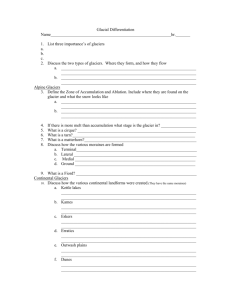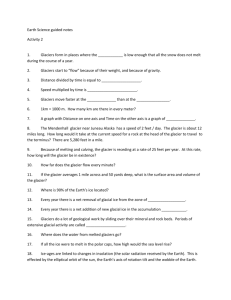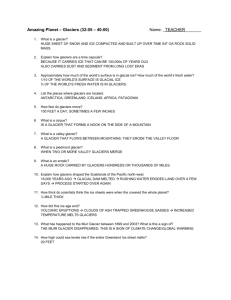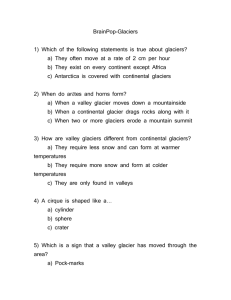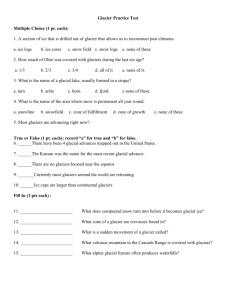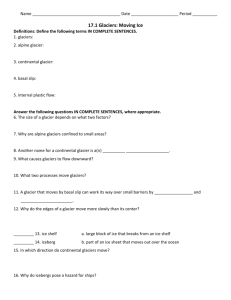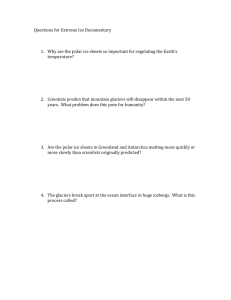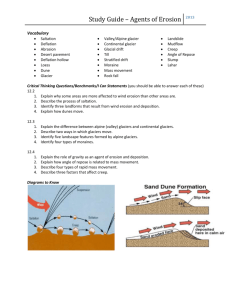trevor
advertisement
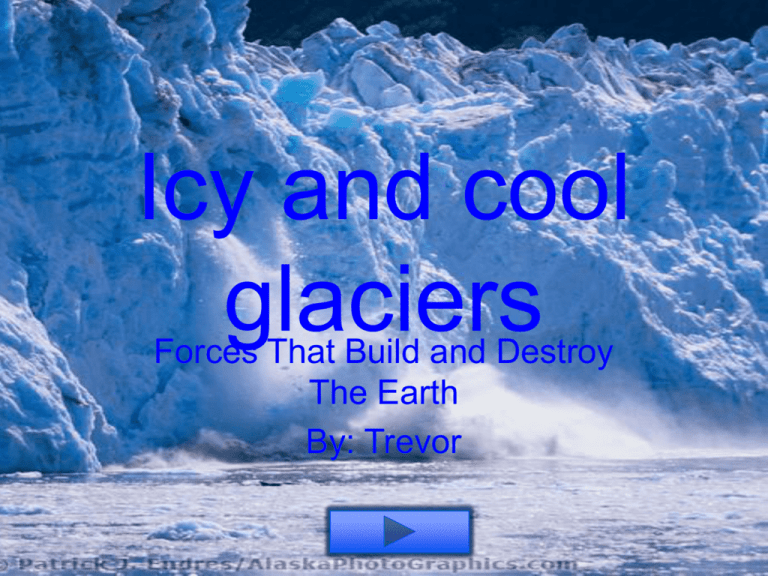
Icy and cool glaciers Forces That Build and Destroy The Earth By: Trevor King of ice Yes, yes now goodbye! *beep* sorry, I was talking to someone on the phone who knows nothing about glaciers! Oh! You want to learn about glaciers? Well, ice and snow are the most important parts of a glaciers. What is a glacier without This? I know! Nothing! Glaciers are all different sizes. Do you know what crevasses are? Well lucky for you I know. Crevasses are more than just cracks. They are split cracks! As in going in all directions. Oh and crevasses can be all different sizes. Now for the… well not grand finale. Glaciers can move very slowly. Small glaciers move about 23 feet a day. A big glacier may move 150 feet a day. It depends on the glaciers mass and weight. Still, I better get moving my self! The way a glacier “rolls” is either by basil sliding or creep sliding. I know those two are opposites. But- oh time’s up! I shall see you G-Later. A wee snowflake can make a difference! Well I made my promise to meet you on the next page so here I am! Oh and by snowflake I meant midget glacier. Ha ha ha! What you don’t like my joke? Oh come on! Anyways a glacier forms when the climate is nice and cool. First, snow must fall. Next a pile of snow forms and ice starts to form and the snow and the ice mix to form a midget glacier. Up next: more glaciers! The midget glacier turns into a glacier after a while. The snow forms in many different areas such as California and other warm not boiling hot places. Phoenix is to hot! It seems farfetched but its true! Where am I? Do you mind that I- uh never mind. Do you know what a Cirque glacier is? I do! Its steep walled, hollow glaciers. They are Immense! No not bigger than a mountain or volcano. Valley glaciers flow through less parallel sides. They are some what alike to mountain glaciers… Its very farfetched but true. Ice caps represent lager masses of ice. Imagine a glacier. Destroy the top of it and pretend it has a smooth dome shape of ice on it. Perfect! You have a ice cap! I think- ouch! It’s a turn the page glacier! Turn the page! TURN THE PAGE!!!!!!!!!!!! BIG DITCH AND A BIG STONE? *pant* I… Am ready *Huff* to tell you… about glaciers shaping land. ( Glacial shaping includes: erosion, interesting landforms, soil, till, debris, bedrock, . If that is to much for you to handle, leave). Anyways, glaciers shape through 2 theories: dispostion and erosion. Drains can leave tons and tons of water behind! Not a joke! Remember what I said about till? You don’t... Oh well. It can make different landforms. One of them are eskers. Eskers are long winding hills. U- shaped valleys are other landforms. When glaciers flow through 2 mountains, it forms a u- shaped valley. There is one more page of this research project left… The grand finale! Destructive and constructive Now, for the moment you all have been waiting for… [drum role]. Glaciers are both constructive and destructive. Glaciers are more constructive because when they flow over land, they create landforms, drumlins, u shaped valleys, drains ( which leave water behind), and bedrock. They are destructive and they destroy land like when they flow over land. Well I guess there is nothing left but the glossary…and the extra slide so enjoy! Glacierebertes Oh come on! This guy is a huge waste of time- oh… hi. Now that you’re here I can tell you about famous glaciers! The first glaciereberte is… Mount kilimango! It’s the largest glacier in Africa! And its 19,333 feet tall! The next glaciereberte is … the Jostedal glacier! 300 square feet! And it’s in Europe! And finale… is the Malaspina glacier! This is it for famous glaciers! Glossary Basil sliding: one way a glacier may move. Opposite of creep sliding. Creep sliding: another way a glacier may move. Opposite of basil sliding. Glaciologists: A male or female who study
